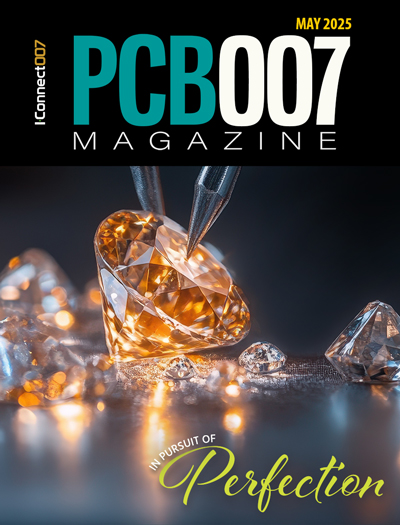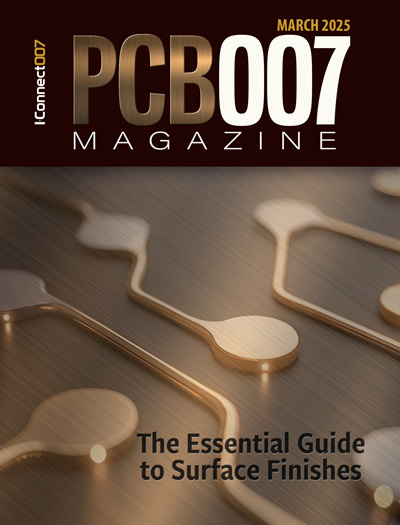-

- News
- Books
Featured Books
- pcb007 Magazine
Latest Issues
Current Issue
In Pursuit of Perfection: Defect Reduction
For bare PCB board fabrication, defect reduction is a critical aspect of a company's bottom line profitability. In this issue, we examine how imaging, etching, and plating processes can provide information and insight into reducing defects and increasing yields.

Voices of the Industry
We take the pulse of the PCB industry by sharing insights from leading fabricators and suppliers in this month's issue. We've gathered their thoughts on the new U.S. administration, spending, the war in Ukraine, and their most pressing needs. It’s an eye-opening and enlightening look behind the curtain.

The Essential Guide to Surface Finishes
We go back to basics this month with a recount of a little history, and look forward to addressing the many challenges that high density, high frequency, adhesion, SI, and corrosion concerns for harsh environments bring to the fore. We compare and contrast surface finishes by type and application, take a hard look at the many iterations of gold plating, and address palladium as a surface finish.
- Articles
- Columns
Search Console
- Links
- Media kit
||| MENU - pcb007 Magazine
Jason Chung Offers the Asian Perspective and Explains Ventec’s Aim to Differentiate
May 11, 2016 | Pete Starkey, I-Connect007Estimated reading time: 5 minutes
I spent a few minutes with Ventec’s Jason Chung whilst attending CPCA recently, where I had the opportunity to absorb his views on the current China market, the importance of setting yourself apart in a tight economy, and the value of bringing stability to customers.
Pete Starkey: Jason, tell us a little about the China market currently and how things have been going for you.
Jason Chung: First of all, I do think this year is quite difficult because of the economic situation. We did not see any bounce-back or any signals that we will recover this year, at least in the first half.
Starkey: Do you see this as a geographical or a worldwide thing?
Chung: A worldwide thing, and the China situation is worse. Everybody has to find their strengths, and develop something different.
Starkey: I can see the need to differentiate yourself in order to make progress in the market. I know that Ventec is a very independent company. You're not as reliant on outside suppliers as a lot of other companies in the market. You have control of your own resin chemistry, which gives you a big advantage.
Chung: The Asian point of view is quite different from the one you would have heard when you interviewed Mark Goodwin or Martin Cotton. Here, everybody is focusing on mass production—they make things at lowest cost and just want to sell more and more, so they focus on turnover rate. At Ventec, we don’t do it that way. We want to use our strengths to develop our own business. We have our independence and the capability of developing new materials for the customers’ future needs. Also, we have global logistics strength. We have our own organization overseas, and we have the technical support. We have hired very capable people to work with us to develop the OEM business.
We also can offer a full range of products to satisfy our customers if they want one-stop buying. So that's our difference. Also, we always say that the most important part of the enterprise is our people. Here, our manager-level people have all been with us for more than 10–15 years. So that's what we’re made of. We have a very different position than our Asian competitors. We look at long term, not just short term development.
Starkey: It's certainly apparent from the outside world that you are a very stable company; you're a family of people, but you're an integrated family of people. Not just in product development or manufacturing but in, as you say, the worldwide distribution network, the worldwide support network. I think this is a point that comes over very clearly from the outside: that Ventec has got an integrated supply chain, and it's got ownership of that supply chain all the way through from you sourcing your raw materials right through to the end user.
That gives an awful lot of security and an awful lot of confidence I think to the end user. But the end user doesn't necessarily have the choice of what material he uses, because the PCB fabricator is just the guy that works to someone else's design and someone else's specification. As you say, you've developed all of these OEM relationships, because it's the OEM that is the design authority and the OEM that specifies the material. With the structure of your company, the high-level contact that you have with the OEM engineering and design guys, really that is what feeds back to your development guys as to what is the next generation of requirement.
Chung: Yes it does. The world has just become one; it’s not like before. It's not like we say, "in this territory, we are the king." Now it's globalized, so everyone has to come to the battlefield with competitors from all over the world. We've got to have different strengths for different territories. For example, in Asia, we know how to make mass production, and to have cost reduction or cost savings for the customers. But in other areas or other territories, we've got to have the strengths to develop new materials for the customer, and you’ve got to know the end products and the trends. They need reliability, and they need different kinds of test. They want to change the world to be lighter and smaller. So then how do you maintain reliability? It's not just a resin development, it's also a process development.
You've got to understand their perspectives, and then you can know how to resolve their problems. It's complicated, so we must have experience in the technology capability in order to resolve all the difficulties. So that's the real world. It's more complicated. That's why I want to say we really believe that we have very good networking, because we are a globalized company. We have all kinds of strengths, which make us very confident that we stand in a very special position compared to our competitors.
Starkey: It must be true that because you are global, as you say, lessons that you learn in one geographical area, one market sector, can give you information that you can use to satisfy the requirements of other market sectors. Even if those requirements are not the same.
Do you find there’s much variation across your world market in terms of which sort of products fit into which sort of market areas?
Chung: Yes, it's complicated. We saw the variations and we also see different applications. They have the same requirements, like reliability and stable products or properties. So you've got to have your strengths in common. Then your customers know that Ventec can provide all kinds of materials, all high reliability, and that our properties are very stable. So that's what we want to make. I think currently we are successful in that; we just want to build our image into the market.
Starkey: I think that image is established. As you say, regardless what the product or product specification is, one thing is not negotiable, and that is that you will always supply a high-quality, consistent, high-integrity product.
Anything else that we should discuss? I know how busy you are, and I appreciate that you've taken time that you can ill afford.
Chung: I think this year has been difficult, so I just want to say good luck to everyone, even competitors, and all the customers. I hope that the economic situation sees a turn-around in this cycle.
Starkey: I think that the forecast is that we will see the bottoming out mid-2016, and then by the turn of the year, 2016–2017, the growth will start to be positive again. We're in an industry that is subject to cycles that are dependent on all sorts of different factors.
Thank you for your time. It was great to talk to you.
Chung: Thank you.
Suggested Items
Global NEV Sales Top 4 Million in 1Q25; BYD Remains Dual Leader, Xiaomi Enters Top 10 in BEV Segment
05/21/2025 | TrendForceTrendForce’s latest reports reveal that global NEV sales—including BEVs, PHEVs, and FCEVs—reached 4.02 million units in the first quarter of 2025, marking a 39% YoY increase. NEVs accounted for 18.4% of total global auto sales for the quarter.
Electroninks Acquires Complete UTDots Advanced Materials Nanoinks Portfolio and IP
05/19/2025 | ElectroninksElectroninks, the leader in metal organic decomposition (MOD) inks for additive manufacturing and advanced semiconductor packaging, announced it has officially completed its full acquisition of UTDots products and IP into its portfolio, further expanding its offerings in digital printing for high-performance applications.
The Marketing Minute: Wired for Trust
05/21/2025 | Brittany Martin -- Column: The Marketing MinuteWhen it comes to marketing, people aren’t looking for a sales pitch. They want useful insights from someone they trust. That’s where ethos, or credibility, plays a key role. In classic rhetoric, ethos is all about credibility, or how much trust and authority you bring to the table. In modern marketing, it’s still the secret sauce. The best part? You don’t have to be a celebrity or a Fortune 500 brand to earn it.
Global PCB Market Forecast to Reach $86.5 Billion by 2029 with 5.9% Annual Growth
05/19/2025 | EINPresswire.comThe printed circuit board market size has witnessed steady growth in recent years and the trend is anticipated to continue. Increasing from $65.82 billion in 2024 to $68.75 billion in 2025, it showcases a compound annual growth rate CAGR of 4.5%.
IDC Expects Worldwide Telecom Services Market Growth to Slow Due to Uncertainty
05/19/2025 | IDCWorldwide spending on telecom services and pay TV services reached $1,510 billion in 2024, reflecting a 2.2% year-on-year increase, according to the Worldwide Semiannual Telecom Services Tracker published by International Data Corporation (IDC).


